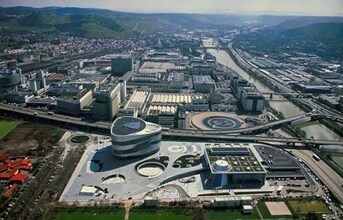
Wolfgang Nieke, Chairman of the Works Council, Mercedes-Benz Untertürkheim plant and Development Passenger Cars: "With this agreement, we are safeguarding the location and its jobs for the future.
The agreement contains binding commitments regarding investment, additional production volumes and products, and the production of fuel cell systems as a key technology of the future. This has been one of our aims for years. The structure of the location will change, but the number of jobs will remain stable for many years and working conditions will be maintained. The 150 additional positions in vocational training are a particularly good sign for us."
The Untertürkheim plant will become a center of competence for highly efficient engines, hybrid powertrains and the production of fuel cell systems. From June 1, Untertürkheim will assume responsibility for a facility in Nabern in the greater Stuttgart area where assembly of the fuel cell system will take place.
The Nabern facility will remain the center of competence for the overall development of fuel cell drive systems under the direction of Daimler AG. "Alternative drive systems are an important element of our future mobility. Their share of automotive production is set to steadily rise over the next few years, complementing our highly efficient engines within the portfolio.
This is what we have laid the groundwork for today," said Schäfer. At Daimler, the electrification of the powertrain has long been on the agenda with regard to the future of mobility. The company already offers a wide range of battery-electric vehicles and hybrids around the world. The PLUG-IN HYBRID will be the front-running technology for the next decade at least.
With the S 500 and C 350, a total of ten new Mercedes-Benz PLUG-IN HYBRID models will be on the market by 2017. In addition to introducing more battery-electric models in the next few years, Daimler continues to pursue the aim to bring to market competitive electric vehicles powered by fuel cells - a clear statement for sustainable mobility of the future.
The traditional production of engines, transmissions, axles and components at the Untertürkheim plant will be comprehensively realigned, and further capacities will be added.
The focus of the efforts to streamline and modernize the product portfolio is to keep in-house products with competitive relevance and to assign other tasks to suppliers. The foundry in Esslingen-Mettingen and the forge in Untertürkheim are integral parts of the plant and will remain so in the future.
In addition, assembly capacities for engines in Untertürkheim will also be significantly increased. The plant will add to its engine portfolio two new gasoline engines and a new four-cylinder diesel engine.
With respect to transmissions, the plant will focus exclusively on the production of automatic transmissions for rear-wheel drive vehicles while building up additional assembly lines over the next few years. Peter Schabert, Head of Powertrain Production and Site Manager Mercedes-Benz Untertürkheim plant: "The plant will thus receive investments amounting into the billions over the next few years for the realignment and modernization of our production."
END


























